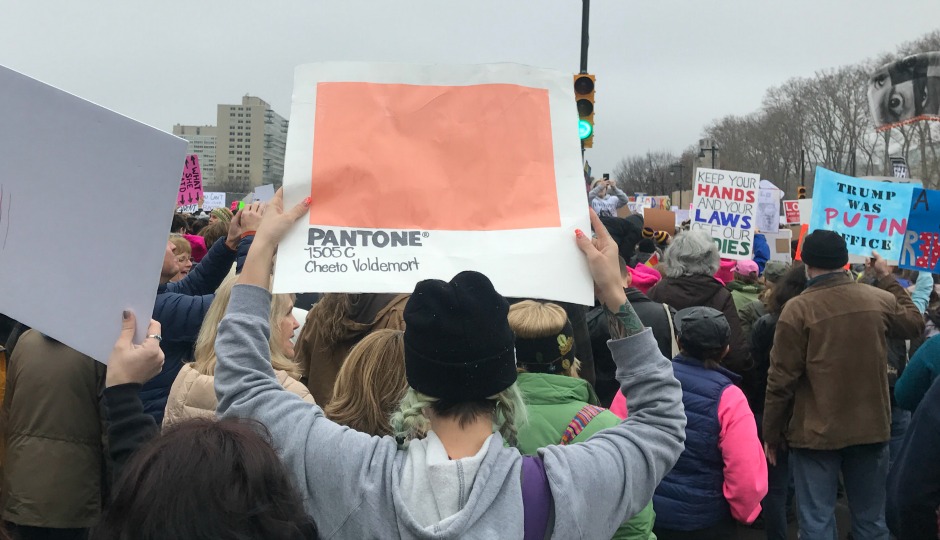OPINION: The Unbearable Privilege of Trump Protesters

Protesters on the Parkway, January 21, 2017.
Picture this: You just received a Facebook event invite to an epic Donald Trump protest in Philly (Women’s March, “Queer Rager,” Muslim travel ban airport demonstration, or V.P. Pence visit — pick one).
You either plan to take off work early or cancel your TV binge-watching — this is that much of a priority for you. You make sure you create a catchy sign that you believe will let people know precisely what issues you have with the president. Let’s just say you think he’s a bully who picks on marginalized people. Your sign reads: “Hey, Big Mean Orange Guy: Quit Bothering the Melting Pot on Aisle 1776.” (Witty, I know.)
Then you hit the streets with thousands of other people and feel the gratifying release of the frustration and fear you’ve been harboring since Election Day. Seeing the media out there snapping photos and recording the crowd reassures you that this effort wasn’t in vain, and you’re so overwhelmed by the level of participation that you know, deep down inside, change is going to come — but first you must take a selfie, Facebook Live the throng, and snap a few shots of the funniest signs you saw.
Eventually the crowd dies down and you head home. You’ve just felt the adrenaline rush of doing something that was larger than yourself, and there’s a thrum of newborn activism in your soul. You’re now inspired to change the world — you might actually donate or volunteer at one of those organizations that gave you a flyer. I mean, it’s the very least you can do, right?
And this line of thinking is exactly the problem with the current movement against Trump. Because, newsflash: You haven’t done shit.
I can already hear the defenses cranking up: “Of course I have — I just renewed my ACLU membership and spent hours on the phone trying to get through to Pat Toomey.” But as I have begun to reflect on covering and participating in these citywide Trump demonstrations, I have to tell you that kind of attitude has me asking myself: What in the hell are we doing this for? Is this what activism has become?
In recent weeks I’ve noticed a pattern of social elitism at the heart of these events that encourages a false sense of competition among individuals (think of those nonprofit groups that pride themselves on having the highest member turnout or loudest chant). This competitive spirit is connected to a showmanship of unbridled privilege that inflates egos and taps into society’s cult of celebrity. In other words: If there’s a way to signal personal nobility in dark times, people will take every shortcut to get there. What easier way to feel good about yourself or appear to be taking a stand than simply showing up to a protest or sharing a donation badge on Facebook? If only it were that simple.
The very nature of our local demonstrations is privileged. I observe crowds of mostly educated and/or upper-middle-class people with sophisticated signs, creative shirts, and flexible work schedules allowing them to hit the streets during regular business hours to take a stand against conservatives in their liberal city. Meanwhile, poorer Philadelphians who can’t afford to take off because they have to work overtime (likely for minimum wage) must view survival alone as their only form of resistance. It’s an important element to the narrative that is often ignored as the city’s more visible protesters pride themselves on speaking up for the working class while competing to go viral for having the most buzzworthy signs. These are the attention-seeking moments I loathe the most because they reveal how tone-deaf many of these newborn protesters are to what social justice advocacy is really all about.
As someone raised by a family who marched and organized during the civil-rights movement, called for national divestment against apartheid in South Africa, and fought for fairer wages during union labor strikes, I grew up understanding that protests weren’t glamorous or social-climbing opportunities. It is about survival, not feel-good slacktivism. The entire premise of a protest is to disrupt, resist, and rebel — if you’re still comfortable and safe, you’re not doing it right.
Privilege blinds many of the city’s newfound protesters from seeing the necessity of taking real risks. Sacrifice is what it will take for us to seriously challenge the Trump administration. That means that everyone can’t be doing the same thing and while expecting a different result. The more power and influence you have, the more resources and energy you should be contributing to the movement. Translation: A corporate executive and a teacher shouldn’t be contributing the same amount of effort to the fight.
Furthermore, protest requires so much more than just foot-soldiers in the streets — it depends on acts of resistance in institutions and structures of power. It was an act of protest and defiance when former acting Attorney General Sally Yates defied Trump’s Muslim travel-ban. The same with the unconventional reporting of local journalist Emily Guendelsberger, who sneaked into the GOP retreat and audiotaped their plans for repealing Obamacare. Both of these individuals made personal sacrifices (Yates got fired, and Guendelsberger is potentially under investigation) to advance the movement. Neither of them needed a bullhorn and a photo-op.
I would like to see more nuance in how our city responds to Trump. The massive public demonstrations are great, but that shouldn’t be the only way we respond. There’s too much power and influence in this city to just rely on marching chants and signs to make the message loud and clear. It’s time to take sincere risks and get out of our comfort zones. Let’s not forget what this is all about — protecting our rights. Do I really need to remind you of this?


